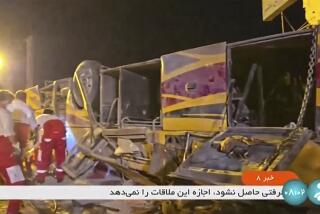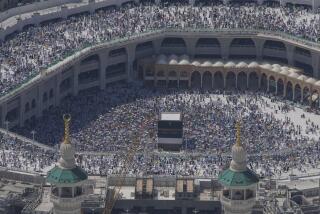Blast kills 31 Shiite pilgrims
- Share via
BAGHDAD — In a cruel ending to an annual Shiite Muslim ritual, a suicide bomber Sunday rammed a car laden with explosives into a flatbed truck carrying dozens of pilgrims home after a weekend celebration. At least 31 of them died.
The attack in the capital brought to more than 220 the number of pilgrims slain in sectarian attacks in the last week, when millions of Shiites began converging on the holy city of Karbala. Some were shot to death by suspected Sunni Arab extremists as they trekked from Baghdad, 60 miles away, or from cities farther afield. Others were killed when suicide bombers detonated explosives belts in their midst.
Those targeted Sunday had thought they were the lucky ones. They had survived the walk to Karbala, and a generous benefactor had given them a free ride to Baghdad on a flatbed truck. They had saved money and avoided the risks of riding public buses, which are frequent targets of bombers.
It was a joyful journey, with about 70 pilgrims, mainly young men but some women and children, sharing the back of the truck and waving colorful flags to celebrate the close of the holy event, which commemorates the death of Imam Hussein, a grandson of the prophet Muhammad.
“Despite being tired, we were happy to arrive in Baghdad, and we felt safe,” said Qassim Ridha, 42, who was on the truck. Passengers were chatting and were eager to get home, said Ridha, who remembered only a “huge explosion” near the back of the truck.
He woke up in a Baghdad hospital, suffering from burns and shrapnel wounds to his head. Back at the site of the blast, in the Karada district, the charred remnants of the truck lay in a smoldering pile, and the pilgrims’ flags were just one color: red, from the blood that soaked them. Bloodied mattresses, blankets, and other belongings covered the street.
It was one of several attacks that left at least 43 people dead across Baghdad, including at least 10 killed when a suicide bomber blew himself up aboard a public bus headed toward the Shiite stronghold of Sadr City.
In addition, police reported finding the bodies of 20 men throughout Baghdad, all shot execution-style and presumed to be victims of Shiite death squads.
Military officials acknowledge that large-scale attacks, hallmarks of Sunni Arab insurgents, have increased since a new U.S.-Iraqi security plan was launched in mid-February.
The plan has put more police and military checkpoints on the streets, but insurgents are taking aim at them, as well as at large public gatherings, as they try to derail the security plan, undermine Prime Minister Nouri Maliki’s government and drive out U.S. forces.
Sunday’s violence began when a car bomb blew up in Karada about 11:45 a.m., killing at least two people. About an hour later, a bomber hit the pilgrims’ truck in another part of Karada.
“I don’t know what is going on these days,” said Salih Merza, a grocer in Sadr City, where many of the victims of the truck bombing lived. “It is not an act of bravery to kill innocent, unarmed people.”
Merza said bombers clearly were trying to stir up sectarian violence. “But I wonder how such hostilities would end if they were ignited,” he said.
Elsewhere in Iraq, an explosion rocked the building of a Sunni political party in the northern city of Mosul. Three guards outside the building died.
In Musayyib, south of Baghdad, three police officers died when an explosive they were trying to defuse blew up.
In the northern city of Kirkuk, police credited a eucalyptus tree with saving lives. Witnesses said a rocket prematurely exploded after hitting the top of the tree.
“It was such a powerful explosion, which would have claimed the lives of many people had it landed on the ground,” said one witness, Sarmad Jabbar.
However, another rocket crashed into a crowded parking garage near Kirkuk General Hospital and killed three people, U.S. military officials said in a statement.
Also Sunday, the U.S. military announced the capture of 15 people accused of involvement in terrorist activities. The arrests came during a series of raids targeting Sunni insurgents linked to the Al Qaeda terrorist network, U.S. officials said in a statement. It said one of those captured was suspected of leading a network that recruited foreign fighters to join the Sunni-led insurgency in Iraq.
The military also said it had captured a man suspected of financing insurgent activities in Kirkuk, where Arabs and Kurds are vying for power.
The arrest took place Wednesday, the military said, adding that the suspect was accused of collecting and distributing funds to support insurgent attacks against civilians and U.S.-led forces.
*
Times staff writers Saif Hameed and Raheem Salman and special correspondents in Baghdad, Hillah and Kirkuk contributed to this report.
More to Read
Sign up for Essential California
The most important California stories and recommendations in your inbox every morning.
You may occasionally receive promotional content from the Los Angeles Times.











